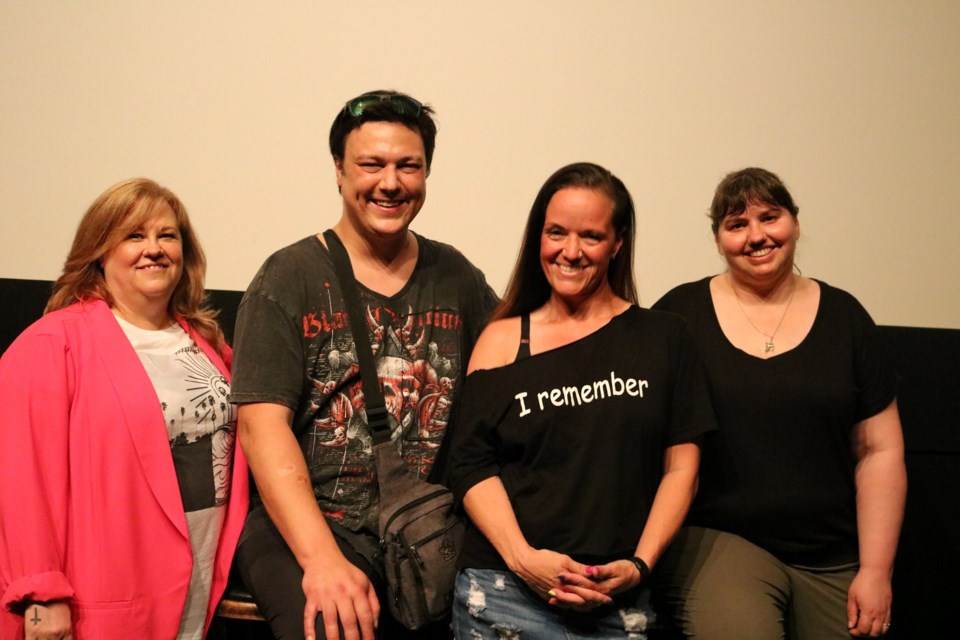GUELPH ‒ A safe drug supply is one of the ways the city can improve access to life-saving resources.
That was one of the messages delivered during a panel discussion Tuesday night about the drug poisoning crisis, where three panelists shared their lived experiences with substance use.
The locally-informed panel discussion came after the screening of the documentary Love in the Time of Fentanyl at The Bookshelf, hosted by the Wellington-Guelph Drug Strategy Peer Advisory Committee.
The main focus of the evening was to create a discussion on how to break the stigma surrounding substance use, the importance of compassionate language, and how peer-led groups like WGDS take the mental brunt of the province’s inaction.
“In a job like mine, sometimes you just feel like you’re banging your head on the wall and I think everyone here can feel like that too,” said Adrienne Crowder, manager of WGDS. “I’m so amazed and touched by this moment…it’s very moving to be here and have people care because it seems like there’s been an awful lot of not caring.”
Panel participants, Denise Watterson, Lara Haines-Love, and Andrzej Celinski, who all have lived experience with opioids, answered questions and commented on the documentary in a room of over 100 people.
“Talking about drug use in an overdose manner is pulling the idea in the wrong direction because people aren’t overdosing, people are being poisoned,” said Watterson, a peer practice lead with CMHA. “Until people understand that … they’re not going to see a need for safe supply.”
Directed, edited, and co-produced by Colin Askey, Love in the Time of Fentanyl follows a group of former and current drug users who operate a renegade safe injection site in Vancouver's downtown east side.
“If people were dying at this rate for any other reason, we would not be in this position,” said Tonya Evans, a peer navigator at CMHA. “Our community is only as weak as its most marginalized and unwell people.”
Taking a moment outside the cinema during the viewing, Celinski was approached by a group asking what movie was playing. When they read the word fentanyl in the title, they quickly turned on their heels.
“(One of the documentary characters), Narcan Jesus, spoke to coming into the network and having some hesitancy,” said Celinski. “But then when you see (and meet people) first hand and you take time to learn, your mind can change.”
Guelph-Wellington-Dufferin had 31 opioid-related deaths from January 2022 to September 2022, nearly double what it was for the entirety of 2020.
Guelph is currently home to one safe injection site at Consumption and Treatment Services, formerly known as the overdose prevention site (OPS), which opened in 2018.
“The further out of town you get from Toronto and larger cities, it gets more complicated (to access safe supply),” said Celinsky.
However, while access is improving, carrying the weight of the crisis is leading to burnout among peer support workers and increased levels of fear throughout the community.
“When I first started on the pathway to peer, rage happened a lot and I realized I was using it in the wrong way," said Watterson. “But I’ve learned to bracket that…when I find something that really excites me, that’s when pull all that out and I use it then.”
But as panelists and the documentary explained, without peer support, resources will suffer.
“I can tell you from working at a safe injection site that people say if they didn’t have peers working there, they wouldn’t come,” said Haines-Love. “I think sometimes because…people see nurses as doing all of the life-saving work but that’s not it- we work as a complete team.”
The WGDS is currently fundraising for a Living Memorial to remember those lost to the drug poisoning crisis as honouring or grieving those lost is “surrounded by stigma.”
The group is aiming to reach its goal of $50,000 by December; $14,500 has been raised so far.
Isabel Buckmaster is the Local Journalism Initiative reporter for GuelphToday. LJI is a federally-funded program.


